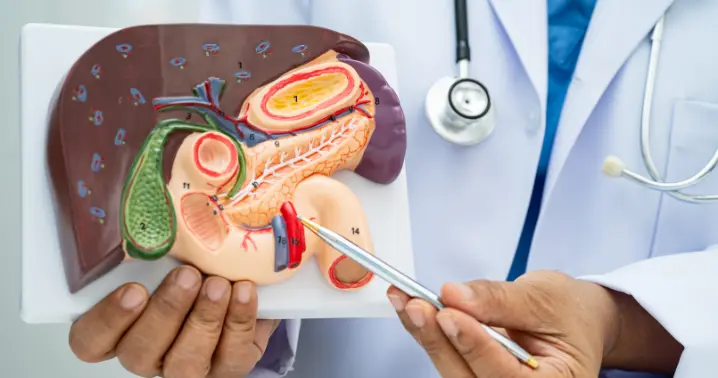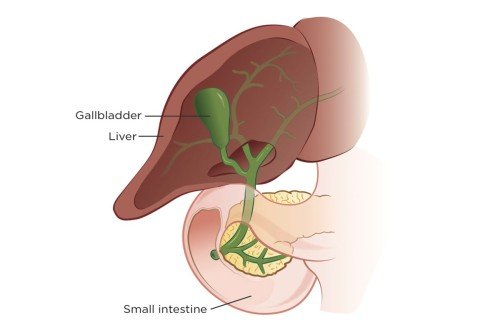- Home
- Gallbladder Cancer
Gallbladder Cancer

Gallbladder cancer is a relatively rare but aggressive type of cancer that originates in the gallbladder, a small organ located beneath the liver. Though not as common as other gastrointestinal cancers, it is more frequently diagnosed in certain regions, including parts of South Asia and Latin America.
It is more common in females than males, and the risk increases with age, gallstones, and chronic gallbladder inflammation. Unfortunately, gallbladder cancer is often diagnosed at an advanced stage due to its vague or absent early symptoms.
The mortality rate remains high, especially in areas with limited access to early diagnostic tools and modern cancer care. However, early detection, timely surgery, and advanced treatment options—such as those available in Ahmedabad—can significantly improve outcomes and offer better chances of recovery.
What is Gallbladder Cancer?
Gallbladder cancer is a rare but serious disease that starts in the cells lining the gallbladder, a small, pear-shaped organ located beneath the liver. The gallbladder stores bile, which helps digest fats. Gallbladder cancer often goes unnoticed in its early stages because it typically causes no symptoms or only mild discomfort, making early detection difficult.
As the disease progresses, patients may experience symptoms such as abdominal pain (especially in the upper right side), jaundice (yellowing of the skin and eyes), nausea, and weight loss. Because it is often diagnosed late, gallbladder cancer can be challenging to treat. However, early diagnosis and prompt treatment—including surgery, chemotherapy, or radiation—can improve the chances of successful outcomes, especially when managed by specialists in cities like Ahmedabad.
Signs and Symptoms of Gallbladder Cancer
Common Signs and Symptoms of Gallbladder Cancer:
- Persistent pain in the upper right abdomen
- Jaundice (yellowing of skin and eyes)
- Nausea or vomiting
- Unexplained weight loss
- Loss of appetite
- Fever
- Bloating or a feeling of fullness
- Lumps or mass in the abdomen
Gallbladder cancer often develops silently, with few or no symptoms in the early stages. As it progresses, signs like abdominal pain, jaundice, and weight loss may appear. Recognizing these symptoms early and seeking medical advice can help with timely diagnosis and treatment.
Causes of Gallbladder Cancer
Gallstones:
Long-term presence of gallstones can irritate the gallbladder lining and increase cancer risk.
Chronic Gallbladder Inflammation (Cholecystitis):
Ongoing inflammation may lead to cell changes that trigger cancer.
Age and Gender:
It is more common in people over 60 and occurs more frequently in women than men.
Gallbladder Polyps:
Large polyps (over 1 cm) may become cancerous over time.
Obesity:
Being overweight is linked to a higher chance of developing gallbladder cancer.
Infections (e.g., Salmonella):
Chronic bacterial infections in the bile ducts can increase the risk.
Porcelain Gallbladder:
A calcified gallbladder wall can be a sign of high cancer risk.
Family History:
Having a close relative with gallbladder cancer may slightly raise your risk.
Genetic Mutations:
Certain inherited mutations can predispose a person to gallbladder cancer.
If You Notice Any of These Symptoms
Diagnosis of Gallbladder Cancer
1. Imaging Tests :
- Ultrasound – Often the first test to detect abnormalities in the gallbladder.
- CT Scan / MRI – Helps confirm the presence, size, and spread of the tumor.
2. Blood Tests :
- Liver Function Tests (LFTs) – Checks for liver or bile duct involvement.
- Tumor Markers (CA 19-9, CEA) – May be elevated in gallbladder or bile duct cancers.
3. Biopsy :
- Fine Needle Aspiration (FNA) – A small sample is taken for lab testing.
- Image-Guided Biopsy – Done using CT or ultrasound to guide needle placement.

Treatments for Gallbladder Cancer in Ahmedabad
Surgery
If diagnosed early, surgery to remove the gallbladder (cholecystectomy) or surrounding tissues may offer a potential cure.
In more advanced cases, extended surgery may be required to remove parts of the liver or nearby lymph nodes.
Radiation therapy
High-energy rays are used to destroy cancer cells, especially when surgery isn’t an option.
It can also be combined with chemotherapy (chemoradiation) for better results.
Chemotherapy
Used after surgery or when cancer has spread, chemotherapy helps kill cancer cells or slow their growth.
Common drugs include gemcitabine and cisplatin.
Palliative Care
In advanced cases, palliative treatments help manage symptoms like pain, jaundice, or digestive issues.
Focus is placed on improving the patient’s quality of life and comfort.
Many top hospitals and cancer centers in Ahmedabad offer advanced diagnostic tools and a multidisciplinary team of surgeons, oncologists, and radiologists, ensuring each patient receives a tailored and effective treatment plan.
Risk factors of Gallbladder Cancer
Gallstones:
The most common risk factor; long-term presence can irritate the gallbladder lining.
Chronic Inflammation:
Conditions like chronic cholecystitis increase the chances of cancer over time.
Age:
Risk rises significantly after the age of 60.
Gender:
Women are more likely to develop gallbladder cancer than men.
Obesity:
Excess body weight is linked to a higher risk of gallstones and cancer.
Gallbladder Polyps:
Larger polyps (especially over 1 cm) may develop into cancer.
Porcelain Gallbladder:
Calcification of the gallbladder wall is associated with increased cancer risk.
Family History:
A close family history of gallbladder cancer can slightly increase risk.
Infections:
Chronic infections like Salmonella typhi can raise long-term cancer risk.
Genetic Mutations:
Certain inherited conditions may predispose individuals to gallbladder cancer.
Conclusion
Gallbladder cancer is nothing but an abnormal growth of cells that usually begins in the gallbladder and later spreads to nearby body areas. This is a rare type of cancer but is a major cause of worldwide cancer deaths. Therefore, early diagnosis is the key to its cure and better prognosis.
If you observe any symptoms of this cancer, report to your healthcare professional immediately to get yourself screened and treated on time.

Why Dr. Ridham Shah
A Surgical Oncologist Practicing In The City Of Ahmedabad
- Experience of a decade in treating cancer
- Expertise in Laparoscopic cancer surgery, Robotic cancer surgery
- Expertise in Digestive System Cancers, Colorectal cancers , Peritoneal cancers, advanced abdominal cancers
- Expertise in Cytoreductive Surgery, HIPEC, PIPAC
- Excellent support staff to help you during treatment
- 360 degree care
Specialities

Ovary Cancer

Rectal Cancer

Colon Cancer

Endometrial Cancer

Liver Cancer

Esophageal Cancer

HIPEC Surgery

Robotic Surgery

Vulvar Cancer

Gallbladder Cancer

Stomach Cancer

Pancreatic Cancer

Cervix Cancer
